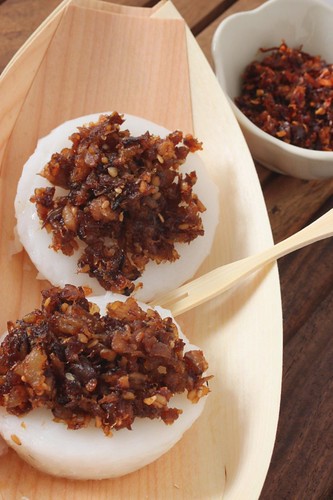
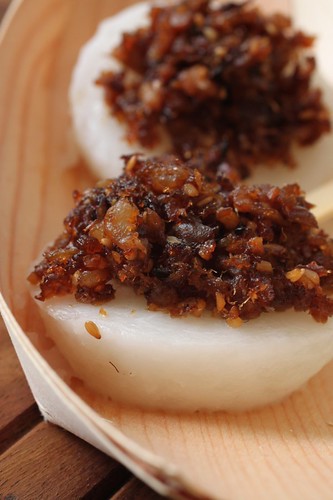
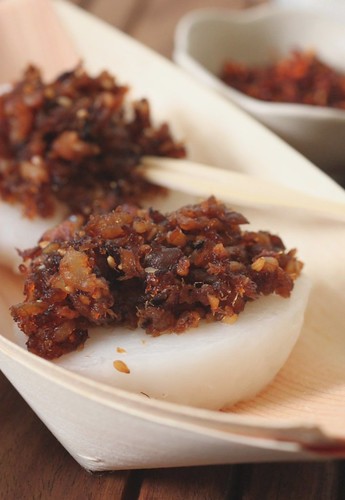
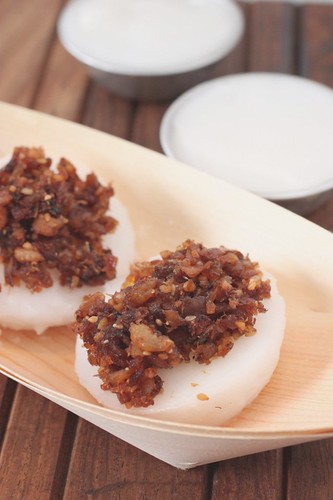
This is my second time postng on Chwee Kueh. The first time was way back in July last year when I first started blogging - when I was struggling with my compact camera and agonising over finding a voice. I don't know if anyone ever read that post but till this day, I have not gotten any comments for it... those were the days.
I decide to revisit this because a 'Chwee Kueh Expert' friend of mine kept asking me if my chai po (preserved radish) has any Heibi Hiam (fried dried shrimps) in it. Unsure if Chwee Kueh is available across the straits in Malaysia but this is a popular breakfast snack in Singapore. Among my friends, there are already a couple of die-hard fans for this and most of them swear by the Chwee Kueh from Tiong Bahru market. That's how this insistence on Heibi Hiam came about - one of them claims that the Tiong Bahru Chwee Kueh has Heibi Hiam in the Chai Po.
Second reason for me to redo this is because I have finally got my DSLR camera. Quite coincidentally, both Ju and myself got the camera at about the same time after playing with a DSLR camera loaned from a friend. After alot of griping about how expensive the DSLR is, we still ended up buying.... almost the same model! But Ju is more fortunate, she got it as a birthday present - I had to dig into my own pocket for it - hence the slightly older model Canon EOS 500D I've had my eyes on this camera for a while, like the way they call it the 'Rebel' in the US. So Trissa, yes, I have finally bought it and like you had adviced earlier, I have no regrets about it - yet. Having a DSLR camera does not automatically guarantee great photos. I still feel that 'the eye' is the most important element in photo taking, the camera is just a medium, a tool to let people see what you see... and there are still many times when I can't see beauty. What the DSLR affords though, is better control over how the photos are captured. I like the fact that I can choose to control what I want to focus on and what I want to de-emphasis. I have been shooting with my new camera for the last three or 4 posts and I must say, the results are starting to become less frustrating compared to the days I was shooting with my compact camera....
Back to Chwee Kueh - for those who have never had this snack before, this is simply a steamed rice cake made from rice flour. The preserved radish is the important accompaniment that gives it flavour and for me, it is the reason to eat Chwee Kueh. For those who have watched the Chwee Kueh vendor work, you would have noticed how the preserved radish is always kept simmering in a copious pot of oil. The beauty of preparing such dishes by yourself is that it allows you to make adjustments and for me I had chosen to cut back the amount of oil used to fry the preserved radish and yes, I did add dried shrimp to it this time and in addition to that, I also added toasted sesame seed for extra flavour. I truly feel I have got a winning Chwee Kueh dish this time - the kueh was extremely tender and the Chai Po is bursting with flavours.
The best part of it is, it is actually extremely easy to make. So here's encore to the recipe with a tweak to the Chai Po...
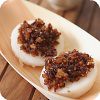
Recipe :
Kueh
Rice Flour 150g
Corn Flour 20g
Water 300ml
Oil 2tsp
Salt 1/2 tsp
Water 800ml
Method :
1. Place rice flour, corn flour in a mixing bowl and add 300ml of room temperature water. Stir well until there are no lumps of flour.
2. In a heavy saucepan, add the 800ml water, oil and salt. Heat the content until it just begin to boil.
3. Pour the flour mixture slowly into the saucepan and stir continuously with a wooden spatula to prevent lumping. The mixture will thicken to a gluey consistency. Turn off the heat and continue to stir.
4. Spoon the gluey paste into individual Chwee Kueh molds (available from Phoon Huat). Steam over boiling water for 15mins.
Chai Po (Dried Radish)
Oil 200g
Garlic(chopped) 50g
Chai Po 300g
Dried Shrimps 30g (pounded or flossed in food processer)
Sugar 3tbsp
Salt 1tsp
Dark Soya Sauce 1tsp
Toasted white sesame 1 tbsp (grounded coarsely)
Method :
1. Heat oil in a heavy sauce pan. Fry Chai Po, dried shrimp and minced garlic until fragrant. Add sugar, salt and dark soya sauce for seasoning.
2. Add toasted white sesame.



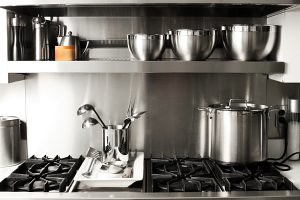





41 comments:
I really like this one and yes, we have this in Malaysia, like everywhere! But good ones are hard to come by though, cuz I can be pretty picky sometimes! I so wanna try this. Can I asked whether did you soak the dried shrimps first before hand since it tends to be salty sometimes. If yes, how long did you soak it for? Did you also soak the Chai Poh? Thanks!
This is my favourite childhood food. Thanks for reminding me of this wonderful dish.
congrats on ur new camera Shirley! ur fotos have always been good anyway...now its going to get even better....but ur right..its all in the camera man/woman...:)) to make it work.
I remember there was this lady we called 'Char Koh Poh' who will cycyle by our house every evening around 8.00pm to sell this. This will be our supper and they were so good and we like to load it up with lots of chai poh and chili. Thanks for sharing it with us and once I get some chai poh I will make some :)
Hi Quinn, I am so happy that I can share this recipe with you. Yes, I do soak the dried shrimps and chai po. For the dried shrimps, I rinse them and soak in water for about 10mins. For the Chai Po, I actually soak in water for 10mins, drain and resoak for another 10mins with fresh water. I actually taste the chai po to make sure that it is not too salty. It is better to start with non-salty chai po and salt it to your taste later. I once made the mistake of not soaking enough and ended up with really salty fried chai po which I had to throw away...
These sound unique with chai po atop!
Beautiful pictures!
that looks so good! wish i could have one right now.
Ooh I love this! I can't believe it's so easy though- it looks like such much hard work!
Anyway congrats on your new purchase, Shirley! I look forward to seeing even more gorgeous photos on your site :)
We call this "Woon Chai Koh" 碗仔糕。The salty variety, cos there is also the sweet variety.
Hi Shirley,
This is like a comfort food. It's simple and it's really nice. I just happened to have chwee kueh last week. But it wasn't as good. I also heard that Tiong Bahru market has the best. Yours looks very good.
Btw, your photograph skills is already very good! I guess the DSLR will enhance it further! I love your pictures and how you captured the angles. Hope to learn from you someday! :)
Congrats, Shirley on your new baby.
Soon, you may end up buying more lens/tools for your camera.
Anyway, your photography are oredi good....just to bring to even more advanced level.
: )
Jane,Irene, thanks for your nice comments. I am looking forward to improve my photography...by paying attention to how other outstanding bloggers are looking at their food :). Hope I won't disappoint!
Seems that everyone is using DSLR now...I am so behind using point-and-shoot...plus, I am still saving up for that expensive gadget.
Your Chwee Kueh looks good! I never thought they were easy to make :)
Tigerfish, I think there are just as many people using the point and shoot camera out there blogging. Take your time to find the right gadget. Also, if you do not have any SLR photography background, be prepared to read up on the basic principles. Otherwise, I think most people will still end up using the automatic mode on the DSLR - which is not going to be too different from your point and shoot.
Congrats on your new camera, this is my dream camera too, but i have a long list items to buy, I think I should give myself a KA mixer first rather than a camera. My Canon G11 actually did quite a good job too. I like to buy this from pasar malam, stir fry with a lot of beansprouts, simply yummy.
I love eating this in food centers in SG for breakfast. We have it here in M'sia, mostly in night / morning markets. The plate that u use to put the chwee kueh is so cute!! like a boat, can i know where u got it ?
Sonia, the Canon Powershot G11 is certainly a good camera- it is already a semi-DSLR. It is new model, I believe. Actually I believe if you had topped up a little, you could have gotten the DSLR already.
Swee San, thanks for dropping by. The 'plate' is actually a disposal holder for Takoyaki(octupus ball). I am not sure if this is some paper or leaf. I got it when I was in Japan last time ;)
Shirley, this looks delicious! And 'ease of preparation' is always appreciated.
Congratulations on the Canon Rebel! You're going to absolutely love this camera.
Although, I admired your wonderful photography before, with a point-and-shoot.
Congratulations Shirley! I know you are right that you have to also have the "eye" for pictures - but it sure does help to have an SLR! :) I've never had chwee kueh but it looks amazing!
Deliciously, deliciously good. Looks even better than what I get here in Singapore. I love this breakfast snack and always try to get the aunty to give me more chai poh. Sometimes lucky and sometimes get the "glare". Haha!
you made these??! you are a genius. This is one of my favorite Singaporean food. and i love it when the radish is crunchy. YUM!
Jo, thanks for the compliments.
Hannah!Being able to make Chwee Kueh does not make me a Genius!!! How I wish it were as easy as that. Seriously, if you take a look at the recipe, it is not difficult -You too, can be a genius!
Hey Shirley, I do remember the both of us griping and hesitating. ;) Well, we have them now, so might as well make full use of them, haha! Actually, the main "advantage" the 550D has over the 500D is the video function, which originally didn't matter to me, until my friend pointed out that it was worth paying extra for, considering that I have young children. Ah well. Having said that, I completely agree with you - "the camera is just a medium". I guess with time and more practice, we'd put our (expensive) "medium" to better use, eh? :) Why would you have any regrets, Shirley? Look at your chwee kueh pics. The pics from the first post weren't bad, but the difference in that post and this is obvious.
These just look so good, specially the topping. I think I will eat the topping with porridge if I don't make the kuih part :D
I love chwee kueh, I hope to make some on my own soon. Yours look good.
Great post Shirley the chwee kueh looks absolutely yum. Can't believe you could be bothered to make it from scratch! Amazing! And the shots are beautiful!
I used to eat chwee kueh all the time during my childhood as one of our neighbors in the kampong sells it. Never thought of making it. So adventurous of you and the pictures are nicely shot. Good investment you have there with your camera!
Congrats on the new camera, your photos had always been beautiful, now the DSLR adds a certain depth to them. Thanks for the tip on adding dried shrimps. The last time I had Tiong Bahru chwee kueh, I thought I could taste soy bean paste (tow cheo) in it, maybe I was mistakened. Well, I'm one of those that read your old chwee kueh post before reading this one, just that I didn't leave any comment. ;)
Hello Ms Moon, thank you for dropping by. Yes, I remember you - I think you were one of the first few who started following me on google followers :) Thank you for your support!
First time dropping in from 3 hungry tummies. You have a lovely blog and very good pictures. I used to eat this when I was studying in Singapore, years ago. Miss it. Think we have it in Malaysia too, perhaps differently named.
Hi there,
Just came across your blog a couple of days ago and have been reading through your posts avidly. Thanks for the lovely write-ups and recipes.
Could you tell me how many kuehs this recipe yields? Thanks.
~ kaz
Kaz, i can't recall exactly but I think it is easily between 15 to 20... Thank you for visiting my blog and I hope you will continue to drop by.
Hihi, have tried this recipe but y is it that after steaming and take out the kuey from mould, i still can smell the rice flour smell?? is there anything i did wrong?? please kindly advise.. Thks
Hi,
I tried ur recipe today. The chai po is super !!! :-). However, I don't know which part goes wrong that my chwee Kueh is too soft. Not sure I shall cut down the water 200 ml in future?
Also, if I wish to cut down the portion, can I simply half all the portion for all ingredients ? (including total water volume ).
Thk u so much for sharing this recipe. Even my chwee kueh is too soft, My kids love it so much. :-)
Hei
Hi Hei, what a coincidence, another reader asked me the same just a few days ago. I am guessing that your flour was not cooked enough before you transfer to the steaming cups. You must use very hot water to mix the flour. Better yet, cook the flour and water mixture over low heat until the flour thickens further. The batter should look like a gluey paste. So you should scoop this into the cup... Feel free to email me at kokken69blog@gmail.com if you have further questions.
Thk so much for your prompt reply. U r so helpful. I will follow ur advice and try again. :-)
Hei
Hei, no problem. Let me know if you need further clarifications.
Hei, no problem. Let me know if you need further clarifications.
Hi,
I have managed to make a decent Chwee Kueh based on recipes.
However, I still could not get the Chai Por toppings right. It seems to be too 'dry'. Should I added more oil or water? The toppings from the professionals seems to be more oily and watery which is what I like.
Thank you so much for the wonderful recipe.
@Anonymous : I am guessing that you did not have enough oil. The chai por at the Chwee Kueh store are always simmering in a pot of oil... did you cut back on the oil?
Hi,
This is a recipe I am definitely going to try. What makes the chwee kueh complete is also the chilli. Do you have a chilli recipe too? Thanks heaps!
Post a Comment